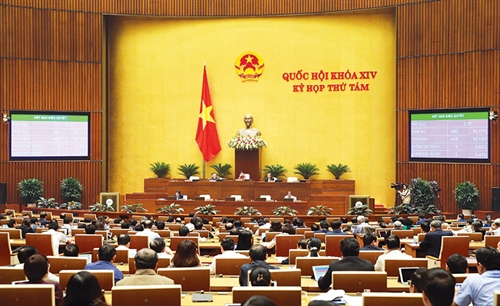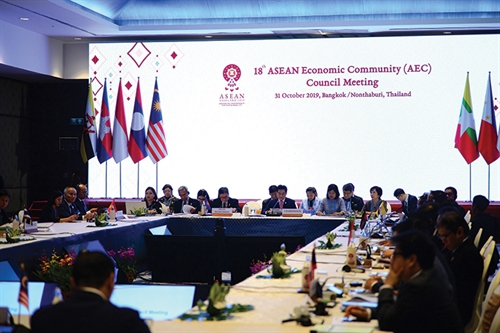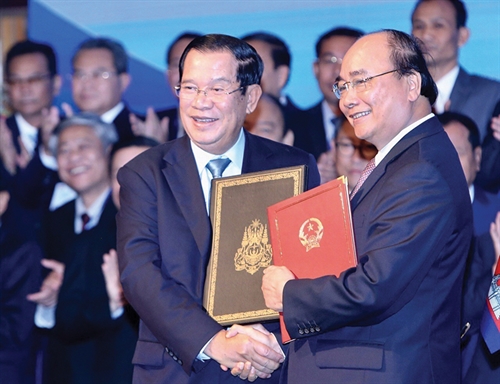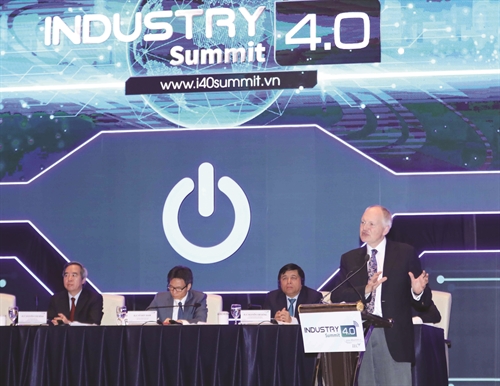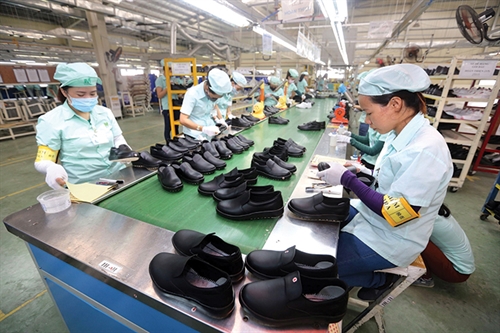Developing the digital economy is considered by many countries an inevitable trend of Industrial Revolution 4.0 (also known as Industry 4.0). The Vietnamese Government has resolved to grasp this development trend while showing efforts to concentrate resources and create an environment for accelerated development of the digital economy.
Associate Prof. Dr. Phan Van Ran and Dr. Ngo Chi Nguyen[1]
Major advantages for development of the digital economy in Vietnam
The world is embarking on Industry 4.0, which is primarily based on the digital revolution. Hence, the digital economy has become a specific feature and the most important trend of today’s socio-economic development. Although it can be defined differently, the digital economy is understood largely as the one with economic and financial relations and operations carried out on the basis of application of information and communication technology (ICT), internet and telecommunications technology in the network of commodity and service production, distribution, exchange and consumption on the global market. In other words, the digital economy is an economy which emerges and develops on the basis of digital technology application.
Albeit a late comer in Industry 4.0, Vietnam is embarking on the era of digital economy development with the following basic advantages:
First, the Vietnamese Government clearly shows its determination, orientation and efforts to vigorously boost the development of the digital economy in the country. For a long-term vision, the report entitled “Vietnam 2035: Towards prosperity, creativity, equity and democracy” has set forth the mission of making full use of Industry 4.0 and digital economy to achieve the goal of getting out of the “middle income trap”, to develop sustainably and elevate Vietnam into the group of 20 largest economies in the world. The Government Resolution 01/NQ-CP of January 1, 2019, on major tasks and solutions for realization of the 2019 socio-economic development plan, set forth such tasks to boost the digital economy as devising solutions to the development of national human resources up to the requirements of Industry 4.0; establishing a national center for innovation; elaborating a national strategy on Industry 4.0; making breakthroughs in the development of telecommunications, broadband internet and 5G infrastructures; working out a national digital conversion scheme, incrementally forming a legal environment for implementation of the digital conversion plan; changing the administration model, boosting the application of digital technology in the fields of finance, banking, healthcare, education, agriculture, tourism, environment, smart city… In reality, the Government has vigorously stepped up the building of e- government and digital government, the formation of a national portal, the strong administrative reform towards digitalization and higher-quality human resources. The slogan “Made in Vietnam” is also considered the Vietnamese Government’s program of action in the economic development in the Industry 4.0 era.
Second, human resources constitute an important advantage for development of the digital economy in Vietnam. Of the national population of nearly 100 million, people aged under 25 represent 40 percent and possess high intellectual levels and fairly good mathematical and information technology backgrounds. Vietnamese are fond of and quick at technology as well as easily adaptable to the new, which is truly an important key for boosting the digital economy.
Third, there exist in Vietnam infrastructure facilities rather favorable for the digital conversion and application, wide and modern telecommunications, information and internet networks which develop fast like in advanced countries. Vietnam is ranked among the world’s top countries with high numbers of internet and smart phone users and high economic growth rates.
Fourth, in recent years, Vietnam’s digital economy has quickly developed in diverse forms, promising a vigorous boom in the coming years. Vietnam is one of regional countries with a fast-growing digital economy. The trend of digitalization, digital conversion and technology application in Vietnam is unfolding in all sectors, from trade to transport, banking, healthcare, education, tourism, entertainment, advertising and online application. Worthy of note among them is e-commerce, which is quickly developing both in forms and market share, becoming one of the world’s ten potential markets with the highest growth rate. Forms of online markets, shopping, trading and entertainment together with delivery services, online payment, card payment and machine payment witness a strong boom, appearing in every aspect of social life, every family and residential quarter. While such world famous brands of e-commerce as Amazon, Ebay, Alibaba and Shoppee are rushing into Vietnam, the e- commerce websites of Vietnamese origin are mushrooming, some of which such as Lazada Vietnam, Tiki, Sendo, FPT shop, Dien May Xanh, The gioi di dong and Adayroi step by step occupy the domestic market share, thus promoting the shopping trend and behaviors of Vietnamese consumers. The figures released by Nielsen, a market research company, show that the annual growth rate of e-commerce in Vietnam reaches 22 percent and the e-commerce access rate reaches 28 percent. In 2018 alone, the e-commerce in Vietnam rose 30 percent. With such growth rates as at present, Vietnam’s e-commerce sector is projected to record the annual growth rate of 30-50 percent and its value can reach USD 13-15 billion by 2020.
Fifth, Vietnam is among countries with the highest economic growth rates in the region and the world. Its economy has grown continuously over the past 30 years and maintained an annual growth rate of around 7 percent in recent years. Together with the high economic growth rate and deeper and deeper economic integration in the world, the people’s higher income, the vigorous development of a middle class and a domestic market of nearly 100 million people serve as the foundation and strong momentum for the development of the digital economy in general and e-commerce in particular.
 |
Limitations and challenges to development of the digital economy in Vietnam
First, as Vietnam is a late comer in the digital economy trend, the awareness of the opportunities and challenges of the digital economy is limited among people, officials and enterprises; the digital conversion at some levels, sectors, localities and enterprises is restricted. According to the annual report on Vietnamese economy published in late May 2019 by the Vietnam Economic Policy Research Institute of the Economics School of Hanoi University, 85 percent of Vietnamese industrial enterprises stayed outside the digital economy and only 13 percent just started. All these have slowed down the digitalization of Vietnamese economy.
Second, the legal and institutional environment for development of the digital economy in Vietnam remains inadequate, asynchronous and non-constructive. Due to the fast scientific and technological development, the digital economy together with new business modes as well as new creative ideas have posed challenges to state bodies in the management of digital economy activities, particularly tax administration and collection with regard to online trading and business via social networks, cross-border service provision, protection of employees’ and consumers’ interests through such networks, the handling and settlement of disputes and conflicts on operation as well as interests of entities participating in business, trade and civil activities in the digital environment. We have had no plans and options to cope with the advent of various bitcoins, Forex markets, etc.
Third, challenges to cyber security, information confidentiality and safety in Vietnam: The information technology and internet-based digital economy poses great threats to information and financial confidentiality and safety as well as privacy of data and economic subjects. Vietnam is among countries being most hacked and vulnerable. In a world with constant connection and universal digital techniques, hacking prevention becomes urgent as it is not only the question of economic security and safety, confidentiality of personal and enterprise information, but also the question of national security.
Fourth, human resources have not yet met the requirements of conversion to the digital economy. Vietnam still lacks high-quality human resources, particularly information and communications technology resources. The Vietnamese education has not yet caught up with the vigorous development of the digital economy, creative economy of Industry 4.0 in the world at present. This will be a major obstacle to the development of the digital economy in Vietnam if appropriate investment is not made in the coming time.
Fifth, the traditional shopping habits, consumption psychology and tastes as well as cash using habit of Vietnamese still prevail, which cannot vigorously change overnight. The digital economy in general and e-commerce in particular still see a big gap between urban and rural areas. Vietnamese consumers, particularly consumers of young generation and the middle class, like to purchase commodities and services on-line from foreign brands other than from Vietnamese websites. This is, on the one hand, due to consumers’ psychology, and, on the other hand, to Vietnamese enterprises’ improper investment in market research and inquiry as well as in branding their products and services, including after-sale care.
Proposals to promote the digital economy in Vietnam
First, to furnish officials and Party members with knowledge on the digital economy as well as Vietnam’s opportunities and challenges in foreign relations and international integration so as to reach unanimity in their thinking and acts, thus creating vigorous improvement in socio-economic management and administration under the digital economy conditions. Vietnam should determine that the strategy on digital economy development and integration is the time’s trend, the important and necessary direction in national development and international integration orientations and the opportunity for Vietnam to go forwards. Industry 4.0 and digital economy environment requires a revolution in management thinking and institution and policy formulation in order to create an environment and space for innovation, start-up and development. All manifestations of the “xin-cho” (ask-give) thinking, group interest protection or administrative order are no longer suitable to national administration and economic management in the digital economy. New business ideas and models should be accepted, creating environments, conditions and opportunities for the nouveau to arise and develop.
Second, to adopt a new strategy on international integration in the era of digital economy, carrying out “renewal” and “integration” in the global digital economy market in couple with encouraging and properly supporting domestic digital enterprises to constantly develop so as to occupy the domestic market and compete in foreign markets.
Vietnam has great potentials for development of the digital economy, but the market scale and innovation capability remain limited with initial steps in technological development and not a small gap with other countries in the region and the world. Therefore, a reasonable integration roadmap should be identified in order to create a favorable environment and conditions for domestic digital enterprises to develop.
Vietnam should create environments for, and promote domestic technological start-up activities, attach importance to investment in domestic scientific and technological research and development activities in the circumstance of intellectual property and technological secret protection.
In the immediate future, favorable conditions and support can be created for the development of a number of domestic economic groups, technological enterprises and digital economy brands, applying preferential policies to the software industry, software parks and hi-tech zones and projects. With market potentials and trend of fast development of the digital economy in Vietnam at present, domestic digital-economy enterprises shall attach special importance to developing and occupying the domestic market as a springboard for sustainable immediate and long-term development.
Meanwhile, the domestic digital economy should be integrated internationally, creating favorable conditions for foreign technological enterprises to start up their businesses in Vietnam in order to boost competition. However, plans and strategies for integration and attraction of investment in the new context must be worked out, targeting at big technological groups and enterprises in the world. Foreign direct investment should be restructured for quality investment projects, hi-tech sectors and enterprises with long-term commitment, which bring about high added-value in association with orientations for on-spot research and development and technology transfer to Vietnam, avoiding to make Vietnam a receptacle for backward enterprises and out-of-date technologies of foreign countries.
Third, Vietnam should actively join international cooperation efforts, mechanisms and initiatives while formulating mechanisms for bilateral and multilateral policy coordination with other countries in areas related to digital economy development, including such important cooperation areas as cross-border tax collection via internet, cyber security and safety, data confidentiality and privacy rights, technological crime prevention and fighting, favorable conditions for infrastructure connection and digital payment to support trans-national transactions, cross-border protection of consumers, handling of legal disputes over economic rights and interests via internet, intellectual property protection… In this respect, importance should be attached to promoting cooperation within multilateral regional and global mechanisms such as ASEAN, United Nations, APEC… with a view to establishing coordination regulations, codes of conduct, treaties, conventions and agreements on cooperation and coordination on relevant issues arising from the development of digital economy.
Fourth, to reform and digitalize agencies and fields of operation related to foreign relations, cooperation and international integration. Foreign-service agencies at home and overseas-based Vietnamese missions should take the lead in digitalization, covering the establishment of national database infrastructure for digital diplomacy, the formulation of a strategy on administration of diplomatic activities, reform of administrative procedures related to foreign relations… In addition, digital diplomacy should be stepped up, developing human resources involved in diplomatic activities, particularly officials in overseas missions representing the Vietnamese state with political quality, knowledge on digital economy, with required new thinking and vision on digital diplomacy, capability to protect, support and promote the interests of the Vietnamese state and enterprises in the environment of integration in the global digital economy.
Besides, internal resources, national strength and preparation of domestic conditions play an especially important role. In this respect, attention should be paid to the following:
First, building and completing the institutional and legal environment up to the requirements of international integration under the conditions of digital economy.
The modern market economy institutions as well as the socialist law-ruled state in Vietnam should be quickly established and developed towards compliance with the objective laws of the market economy and integration, creating a legal corridor favorable for innovative start-up, investment and business activities in the digital economy environment; building, encouraging and ensuring an equal and healthy playground for enterprises of different types and economic sectors, for online and offline enterprises, regarding the start-up and investment environment, tax-related rights and duties; reforming and completing the legal system up to the requirements of integration and development of digital economy, compliance with international standards in the environment of digital economy. Besides, administrative procedures directly related to digital economy, including electronic legal documents, digital signatures, etc., should also be reformed.
Second, concentrating investment in building hard and soft infrastructures for digital conversion and development of the national digital economy.
The Government should invest in developing and universalizing the broadband internet infrastructure nationwide, quickly providing 5G services, attaching importance to the development of core technologies of Industry 4.0. To facilitate the e-commerce development, the national system of e-payment, e-document and transaction information certification, e-transaction management and supervision systems, mechanisms for settlement of disputes and handling of violations in e-transactions should be early finalized.
Together with the upgrading and completion of hard infrastructures, Vietnam should concentrate on breakthroughs in institutional infrastructure, strongly investing in science and technology as well as education, renewing education and training as required by Industry 4.0 and digital economy. This covers the formulation of a strategy on training and attraction of technological talents within and outside the country, developing technological human resources, creating conditions for students of all levels to early approach knowledge on information technology and core technologies of Industry 4.0.
Third, heightening the capability and competitiveness of Vietnamese enterprises while attaching importance to fostering and supplying them with knowledge on digital economy and Industry 4.0 so that they can meet the requirements and adapt to the process of integration in the world market in the new period.
Fourth, further promoting the national spirit, ideal and aspiration to advance to prosperity, creating a motive for the start-up culture of Vietnamese, particularly among youths.
Fifth, the Government should further reform the apparatus up to the requirements of the digital economy and the digitalization of the national administration machinery. The state administration should be restructured to be a smart, streamlined, disciplined and constructive public-service administration, raising the administration efficiency of the state apparatus from central to local levels, shifting from management thinking to administration thinking, eliminating intermediate management bodies, quickly digitalizing the state administration machinery at all levels.
Sixth, attaching importance to the protection of economic security, information security, political security, cultural security and national security in general through the cyber space, overseeing, preventing and combating cyber and hi-tech crimes.-
Director of the International Relations Institute, Ho Chi Minh National Academy of Politics
Dr. Ngo Chi Nguyen
Ho Chi Minh National Academy of Politics
